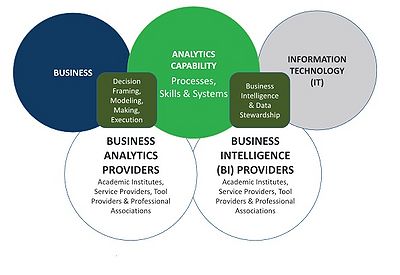Business Analytics in Civil Engineering Projects
| Line 5: | Line 5: | ||
The reader must comprehend that the role of the manager or management team of a civil engineering company is to create and generate the most amount of value possible to the organization and therefore to the investors. In order to be able to achieve that objective, knowledge in business analytics (probability, accounting, finance, statistics, programing) and data analysis is essential and compulsory. This article will focus on how managers should apply business analytics in construction companies and civil engineering projects and will illustrate how to build Models an abstraction of reality that are useful for make good decision, Saxena & Srinivasan (2013) states. | The reader must comprehend that the role of the manager or management team of a civil engineering company is to create and generate the most amount of value possible to the organization and therefore to the investors. In order to be able to achieve that objective, knowledge in business analytics (probability, accounting, finance, statistics, programing) and data analysis is essential and compulsory. This article will focus on how managers should apply business analytics in construction companies and civil engineering projects and will illustrate how to build Models an abstraction of reality that are useful for make good decision, Saxena & Srinivasan (2013) states. | ||
| − | ''For business analytics, a decision model is an abstraction that shows key variables and relationships. We use models to learn about their real-life counter-parts. We judge how well a model corresponds with reality by manipulating its variables and observing the results, and then we use it as a proxy for the complex reality—a useful proxy that can be used to generate insights and optimal decisions. (p.31)'' | + | ''For business analytics, a decision model is an abstraction that shows key variables and relationships. We use models to learn about their real-life counter-parts. We judge how well a model corresponds with reality by manipulating its variables and observing the results, and then we use it as a proxy for the complex reality—a useful proxy that can be used to generate insights and optimal decisions. (p.31)'' <ref name="Desicion Modeling" /> |
[[File:wiki2.jpg|frameless|center|400px]] | [[File:wiki2.jpg|frameless|center|400px]] | ||
Revision as of 09:27, 14 February 2018
Contents |
Abstract
Business Analytics in Civil Engineering Projects and Civil Engineering Companies has become a significant solution in problems of operational management and in decision making. Nowadays with the development of the Information Technology is possible for management team to do the pricing of any kind of project (Infrastructure, Housing and Building, Energy, Environmental) taking into account stakeholders, time, costs, risk, macroeconomic and political context. However, to be able to use the methodology is necessary to understand the importance of using analytical tools such as Project Finance, Monte-Carlo Analysis and in some cases Statistics Linear Methods. The outstanding fact about doing pricing to a civil engineering project with business analytics is that managers and investors will have resume data and factual information about a predicted project, moreover to forecast the project would not only create future indicators but also will support managers in the planning of other areas like legal area (Contracts with suppliers, Governmental, Institutional client, customer) and Risk Management Area.The reader must comprehend that the role of the manager or management team of a civil engineering company is to create and generate the most amount of value possible to the organization and therefore to the investors. In order to be able to achieve that objective, knowledge in business analytics (probability, accounting, finance, statistics, programing) and data analysis is essential and compulsory. This article will focus on how managers should apply business analytics in construction companies and civil engineering projects and will illustrate how to build Models an abstraction of reality that are useful for make good decision, Saxena & Srinivasan (2013) states.
For business analytics, a decision model is an abstraction that shows key variables and relationships. We use models to learn about their real-life counter-parts. We judge how well a model corresponds with reality by manipulating its variables and observing the results, and then we use it as a proxy for the complex reality—a useful proxy that can be used to generate insights and optimal decisions. (p.31) [1]
Building Information Modeling (BIM) Analysis 3D
Time scheduling Analysis 4D
Monte-Carlo Analysis PERT Distribution
Project Finance Analysis 5D
Time Value of Money
Free Cash Flow in the Project
Equity and Debt
Business Analytics vs Intelligence Analytics
common problems in industry construction Colombian case
Buisness analytics good case
References
- ↑ Cite error: Invalid
<ref>tag; no text was provided for refs namedDesicion_Modeling

